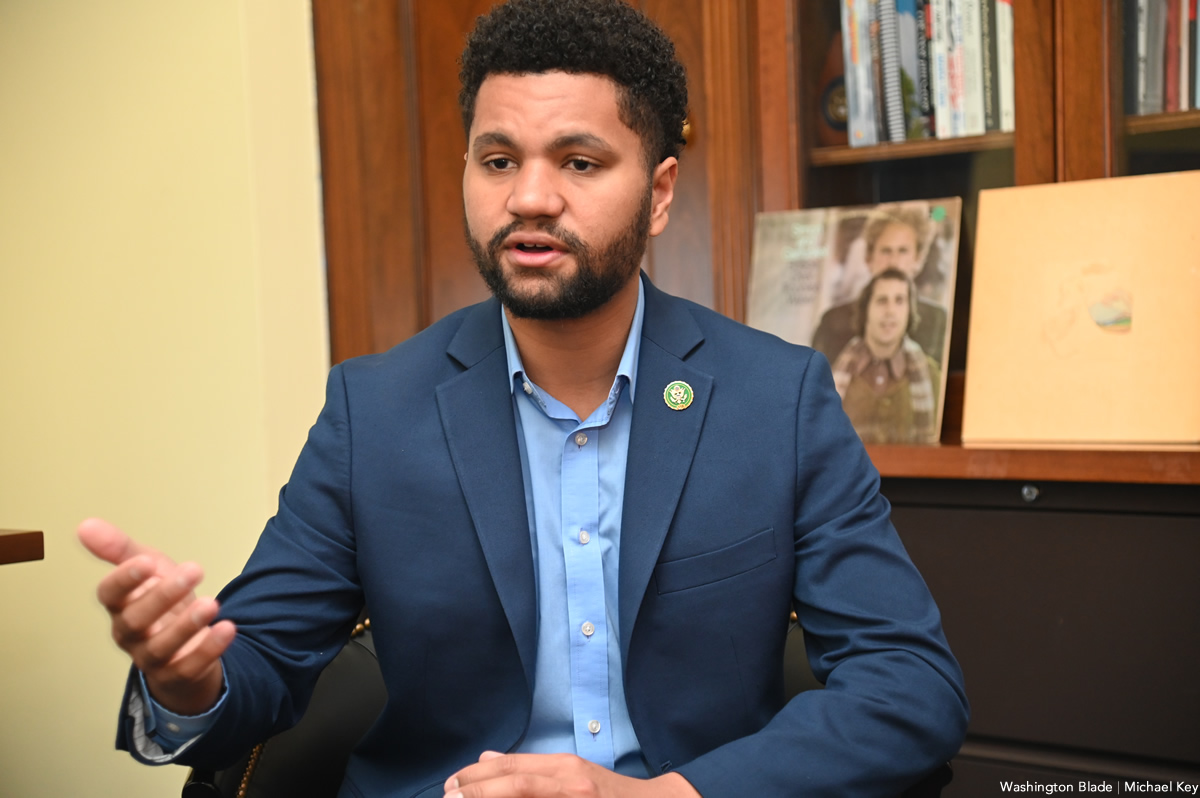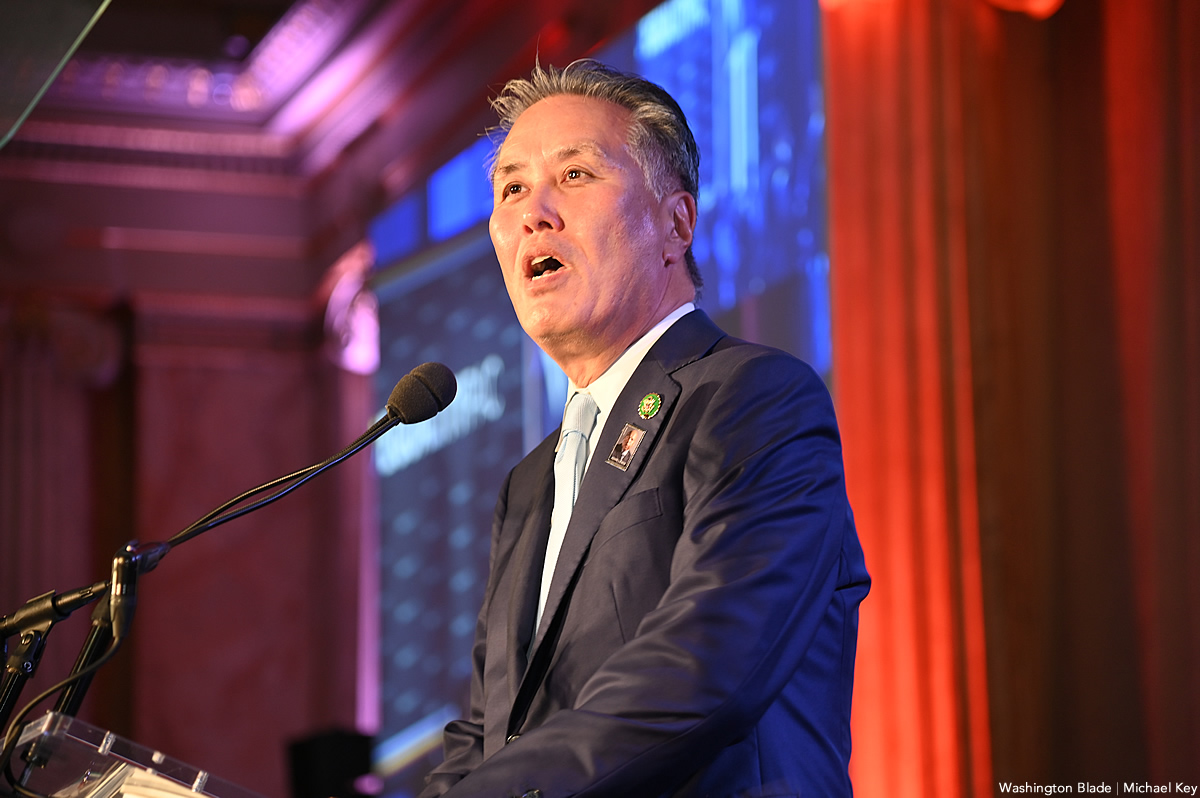Congress
Frost talks gun control with the Blade on anniversary of March for Our Lives
26-year-old congressman has been a gun violence prevention advocate since 2012

Author’s note: The full interview with Congressman Frost will be published next week.
U.S. Rep. Maxwell Frost (D-Fla.), after a week of making headlines for his gun violence prevention advocacy, sat down with the Washington Blade for an exclusive interview on Friday, which marks the five-year anniversary of the founding of March for Our Lives.
The 26-year-old freshman congressman, who before his election was national organizing director for the student-led gun control group, had just introduced his first piece of legislation Tuesday with U.S. Sen. Chris Murphy (D-Conn. that would establish an Office of Gun Violence Prevention within the U.S. Department of Justice.
The proposal’s aim, in part, is to better facilitate the implementation of last year’s Bipartisan Safer Communities Act by establishing a singular office to coordinate that work.
And on Thursday, Frost captured and tweeted a video of a confrontation between U.S. Capitol Police and Patricia and Manuel Oliver, gun control advocates who lost their son Joaquin in the 2018 Parkland, Fla., high school shooting.
The couple had been removed by police from the House Oversight and House Judiciary Committees’ gun rights hearing at the request of GOP Reps. Andy Biggs (Ariz.) and Pat Fallon (Texas).
Frost, who was in attendance, told the Blade the conflict started when Patricia Oliver “just stood up and she said, ‘you took my son’ and she sat down,” but “instead of moving on, the Chair [Fallon] escalated things.”
The congressman said the hearing itself was “a sham” convened for the purpose of attacking the Biden administration’s Bureau of Alcohol, Tobacco, Firearms and Explosives (ATF), the entity within the U.S. Justice Department that investigates violations of laws governing the manufacture, possession, and use of guns.
“The real story here,” said the congressman, “is the fact that there were two parents who lost their son who was in high school, because he was shot to death and died in a pool of his own blood, and now they’re going to spend the rest of their lives fighting for a world where it doesn’t happen to anybody else.”
Frost noted the Olivers were joined at the hearing by other families, activists, and organizers – all of whom were gathered in Washington, D.C., to advance the mission established by the group of teenaged Parkland survivors who founded March for Our Lives five years ago.
Among these student activists were Cameron Kasky, who identifies as queer, and X González, who is bisexual and uses they/them pronouns.
Frost has repeatedly said he ran for Congress because of his involvement in the gun violence prevention advocacy movement, which began with his volunteering on behalf of the Newtown Action Alliance, a group formed in the wake of the 2012 Sandy Hook Elementary School shooting.
The congressman told NPR the 2016 shooting at Pulse, the gay nightclub in Orlando “where 49 angels were murdered right here because they’re queer” marked one of the most significant moments of his life.
That same year and in that same city, Frost himself survived a gun violence incident.
During his congressional campaign, on the heels of last year’s elementary school shooting in Uvalde, Texas, Frost tweeted: “10 years ago I became an Organizer because of Sandy Hook. 3 years later, I’d become a survivor myself. That same year, Pulse. Now I’m running for Congress and 15 lives were taken at another Elementary school. I will not stop until the endless shootings do.”
Congress
Members of Congress introduce resolution to condemn Uganda’s Anti-Homosexuality Act
U.S. Reps. Mark Takano (D-Calif.) and Joyce Beatty spearheaded condemnation

More than 20 members of Congress on Thursday introduced a resolution that condemns Uganda’s Anti-Homosexuality Act.
Gay California Congressman Mark Takano and U.S. Rep. Joyce Beatty (D-Ohio) spearheaded the resolution that U.S. Reps. Becca Balint (D-Vt.), Lloyd Doggett (D-Texas), Adriano Espaillat (D-N.Y.), Robert Garcia (D-Calif.), Sylvia Garcia (D-Texas), Josh Gottheimer (D-N.J.), Raúl Grijalva (D-Ariz.), Pramila Jayapal (D-Wash.), Hank Johnson (D-Ga.), Gwen Moore (D-Wis.), Seth Moulton (D-Mass.), Jerry Nadler (D-N.Y.), Eleanor Holmes Norton (D-D.C.), Mark Pocan (D-Wash.), Delia Ramirez (D-Ill), Linda Sánchez (D-Calif.), Jan Schakowsky (D-Ill.), Brad Sherman (D-Calif.), Rashida Tlaib (D-Mich.), Ritchie Torres (D-N.Y.), and Debbie Wasserman Schultz (D-Fla.) co-sponsored.
“The House of Representatives condemns the government of Uganda’s criminalization and draconian punishments regarding consensual same-sex sexual conduct and so-called ‘’promotion of homosexuality,’” reads the resolution.
The resolution, among other things, also calls upon the Ugandan government to repeal the law.
“It is difficult to overstate the gross inhumanity of Uganda’s Anti-Homosexuality Act,” said Takano in a press release.
President Yoweri Museveni in May 2023 signed the law, which contains a death penalty provision for “aggravated homosexuality.”
The U.S. subsequently imposed visa restrictions on Ugandan officials and removed the country from a program that allows sub-Saharan African countries to trade duty-free with the U.S. The World Bank Group also announced the suspension of new loans to Uganda.
The Ugandan Constitutional Court in April refused to “nullify the Anti-Homosexuality Act in its totality.” A group of Ugandan LGBTQ activists appealed the ruling.
“Instead of focusing on rooting out corruption or ending extrajudicial killings, the Ugandan Parliament, president, and Constitutional Court have chosen to mark LGBTQ+ Ugandans as less than human,” said Takano. “Congress must not be silent in the face of such systematic, state-sponsored discrimination.”
“To all those LGBTQ+ people and your allies in Uganda — we see you,” added the California Democrat. “We and the Biden administration will not allow this terrible violation of basic dignity to go unchallenged.”
Congress
EXCLUSIVE: Sen. Padilla and wife Angela talk LGBTQ mental health
Couple to receive award from Gay Men’s Chorus of L.A. on Sunday

U.S. Sen. Alex Padilla (D-Calif.) and his wife, Angela Padilla, spoke with the Washington Blade for an exclusive interview last week ahead of their receipt of Voice Awards from the Gay Men’s Chorus of Los Angeles at a ceremony on June 30.
“I’ve known members” of the organization “off and on over the years, going back to my days on the city council in Los Angeles,” when battles were waged over California’s Proposition 8 banning same-sex marriage, Padilla said.
“I was proud to be an ally for a long time, but especially in those moments, really, as a public official, as an elected official, knowing how important allyship was,” he said, stressing “the tremendous talent of the chorus” and “what they represented individually and as a group” serving as allies for “young people who may not necessarily grow up in a supportive environment or in supportive families.”
“I work very closely with Joseph Guardarrama,” a board member for GMCLA, “for many years now on my nonprofit, and it’s all in support of mental health and wellness and educating people on how to get help, why they should get help, and why it’s important to take care of your brain,” Mrs. Padilla said by phone.
“I started FundaMental Change in 2017,” she said, to push for “the mental change that I feel that we have to have as a society when it comes to how we look at [and] how we treat mental health conditions.”
The senator’s wife added that LGBTQ people are twice as likely to have a mental health condition while dealing “with so much more social stigma and discrimination” than their straight and cisgender counterparts.
“This month we’re going to have a table for June 30 working with the [California] Department of Mental Health at the Pride parade,” she added. FundaMental Change also operates an LGBT Youth TalkLine and Trans Lifeline.
Padilla noted the organization’s work combatting stigma. “One thing that we recognize both coming from Latino families is the need to overcome stigma,” he said. “There’s a lot of misunderstanding or misperceptions about mental health.”
The effort is also central to the senator’s work as a policymaker, he said, referencing the bipartisan Senate Mental Health Caucus that he founded alongside U.S. Sens. Tina Smith (D-Minn.), Thom Tillis (R-N.C.), and Joni Ernst (R-Iowa) to serve as “a forum for us to share stories.”
“It’s been fascinating, there are more than 30 members of the caucus now, so about a third of the United States Senate,” he said. “It’s 50/50 Democrats and Republicans,” and when approached, every member had a story to share, whether about “something that they’ve been through [or] somebody in their family, a colleague, a neighbor who can relate.”
Padilla said his decision to announce the formation of the caucus concurrently with his visit to the San Francisco LGBT Community Center “was very intentional.”
When it comes to mental health, “We’ve really prioritized trying to develop bipartisan solutions,” he said, “because those are more sustainable here in Congress.”
The first bill backed by the caucus was Padilla and Tillis’s Local 9-8-8 Response Act of 2023, which “was to require the FCC to move to implement the geolocation technology to the 988 system.”
Unveiled by the Biden-Harris administration in 2022, the 988 Suicide and Crisis Lifeline is operated by the U.S. Department of Health and Human Services Substance Abuse and Mental Health Services Administration. The program provides the option for callers to reach specialized LGBTQI+ affirming counselors by pressing “3.”
On the importance of geolocation technology, Padilla said “if I’m here in Washington, and have a need to call 988, my area code on my phone is Los Angeles — so, I’d be passed through to the Los Angeles providers.”
The senator noted that the FCC “is moving forward with those improvements” independently of his bill’s path forward in Congress.
More broadly, some of the policy challenges concern supply and demand problems. “From a bigger picture, longer term perspective, we’re talking about the workforce needs,” Padilla said. “So, what’s the game plan for [getting] more psychologists or psychiatrists or counselors, more therapists, more everybody in the field to better serve people across the country?”
Padilla also discussed the importance of “cultural competence” as a means of guaranteeing the best possible treatment. “When we ask people to go get help, if there’s somebody that they can relate to or that they know gets them, the better quality experience in treatment is going to come,” he said.
“We’re not quite there yet with the Republican colleagues, but I have faith that in time we will get them there,” the senator added. “And again, the LGBTQ community is a prime example. You’ve got to feel comfortable going to somebody when you need help.”
Padilla said, “not everybody comes from a supportive environment; not everybody lives in a city or a state that is supportive. And at this particular time politically, they’re really under attack. They’re being targeted acutely. And that’s more reason and urgency to speak up and stand up.”
On Sunday, the Padillas will share the stage with the recipients of the third GMCLA Voice Award, from the critically acclaimed HBO series “We’re Here,” which follows drag queens as they travel the country to perform in one-night-only performances in small towns.
Mrs. Padilla celebrated the ways in which drag has brought communities together, recalling when RuPaul’s Drag Race “was first airing and it was like everyone was so interested in watching the show” and “it just brought people from everywhere.”
“I have a lot of frustrations, as a Latina, with the misrepresentation of our community and our culture in television and movies,” she said. “And I feel like every opportunity that you get to see something that’s just authentic — it’s such a benefit to everyone. It really helps us understand that we have more in common than not.”
“Drag is not new,” the senator said. “It goes back generations in the United States and I think for the LGBTQ+ community it can be can be very empowering, as an outlet for performers, but also participants in an audience to see on stage what you may not see in other places.”
Republican-led efforts to restrict access to drag performances, especially by young people, “feels like it’s an act of desperation,” Mrs. Padilla said.
“I think they’re resisting something that they don’t understand. I just think it’s really coming from a place of fear. And really not understanding the human behind it,” she said, adding that the reactionary forces are a product of the LGBTQ movement’s success and “that feeling of it’s out of their control.”
“The diversity of our communities, the diversity of our country, is a big source of strength,” Padilla said. “It’s just not always been embraced. I think a lot of people either misinterpret it or frankly exploit it to cause divisions in society.”
“We can’t ignore the political climate that we’re living in,” the senator said, “heightened only by the fact that it’s a presidential election year and we see who the Republican nominee is going to be.”
Looking ahead to November’s elections, he said, “as with so many other issues, LGBTQ+ rights and opportunity in the future — It’s a 180-degree difference between Joe Biden and Donald Trump. Let’s not take it for granted. Let’s not take it lightly. Let’s get out and vote.”

A group of drag queens on Tuesday traveled to D.C. to lobby members of Congress to support pro-LGBTQ legislation.
“Drag Race Philippines” judge Jiggly Caliente, “RuPaul’s Drag Race” season 13 contestant Joey Jay and Brigitte Bandit urged lawmakers to support the Equality Act, which would add gender identity and sexual orientation to the Civil Rights Act of 1964, and the Transgender Bill of Rights, which would add trans-specific protections to federal nondiscrimination laws.
Caliente, Jay and Bandit met with U.S. Reps. Juan Ciscomani (D-Ariz.), Mark Pocan (D-Wis.), Jasmine Crockett (D-Texas), Delia Ramirez (D-Ill.), Greg Casar (D-Texas), and Jen Kiggans (R-Va.) and/or their staffers.
Jay posted to her X account a picture of her, Caliente, and Bandit outside Crockett’s office. The Texas Democrat in response said “you’re always welcome, queens.”
You're ALWAYS welcome, queens! https://t.co/MlUrW3TOJA
— Congresswoman Jasmine Crockett (@RepJasmine) June 25, 2024
MoveOn organized the visit, which it called the Drag Lobby Day.
“Today we brought together a trio of advocates and drag artists to stick up for LGBTQ folks, talk about what’s at stake and fight back against some extremist, hateful attacks, and narratives from conservative politicians,” said MoveOn Campaign Director Nakia Stephens during a press conference outside the U.S. Capitol.
Caliente said the Equality Act and the Trans Bill of Rights “will make it easier for people to find and keep employment and protect our communities more fully from discrimination in housing, health care, and so much more.”
Jay, who now lives in Phoenix, cited statistics that indicate 320 trans people were killed in 2023. Jay also stressed to conservatives that drag queens and LGBTQ people are not “trying to shove our lifestyle down your throats.”
“We are just trying to live in peace without fear of being murdered,” said Jay.
(WASHINGTON BLADE VIDEO BY SEAN KOPEREK)
Bridget Bandit — known as the “Dolly of Austin” — has testified against two anti-drag bills in Texas while in drag. Bandit noted she joined an American Civil Liberties Union of Texas lawsuit against the state’s Senate Bill 12, which would have criminalized drag shows and other performances that took place in front of children, “to fight for our freedom of expression.”
A federal judge last September blocked the law from taking effect.
“This fight is far from over,” said Bandit. “We continue to face the effects of this harmful rhetoric legitimized by our lawmakers.”

Sean Koperek contributed to this story.
-

 Canada1 day ago
Canada1 day agoToronto Pride parade cancelled after pro-Palestinian protesters disrupt it
-

 Theater4 days ago
Theater4 days agoStephen Mark Lukas makes sublime turn in ‘Funny Girl’
-

 Baltimore3 days ago
Baltimore3 days agoDespite record crowds, Baltimore Pride’s LGBTQ critics say organizers dropped the ball
-

 Sports4 days ago
Sports4 days agoHaters troll official Olympics Instagram for celebrating gay athlete and boyfriend











